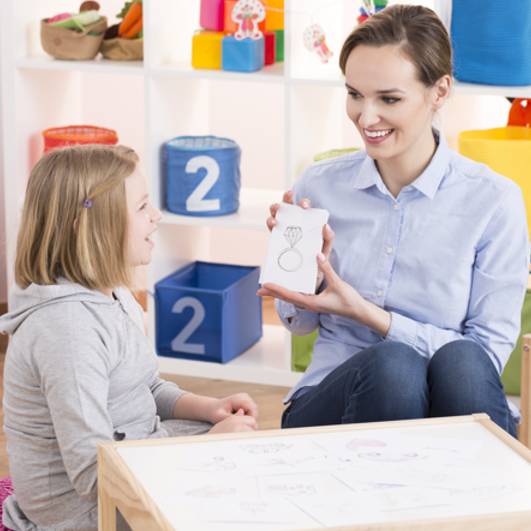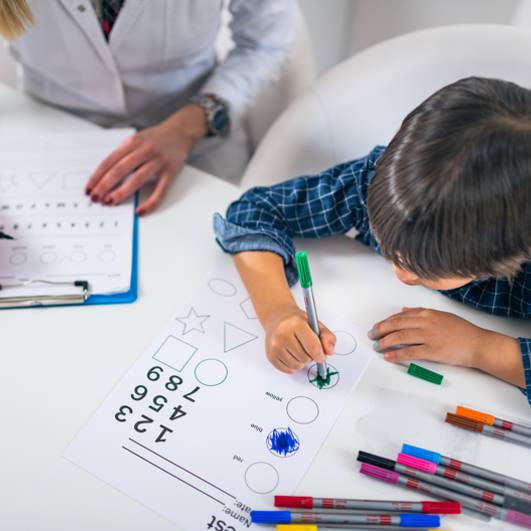About Neuropsychological and Educational Testing
The purpose of a comprehensive neuropsychological evaluation is to determine an individual’s strengths and differences as a means of providing recommendations for individualized and specific educational and treatment plans. Individuals are typically referred when there are questions about developmental delays, difficulties in learning, attention, behavior, socialization, or emotional functioning. Other reasons to seek an evaluation include medical conditions such as a chronic illness, a genetic diagnosis, or an acquired brain injury caused by trauma (i.e., concussions). Neuropsychological and educational evaluations generally assess cognitive abilities, academic skills (reading, writing, mathematics), attention, executive functioning (i.e., planning, organization, completing school work demands), language, memory and learning, and fine motor skills. An evaluation of social, emotional, and behavioral functioning is included to obtain the most comprehensive picture of the individual. A classroom observation may also occur in your child’s school or program setting. This type of assessment can be conducted as early as the preschool years, into the graduate school years. Various measures are used and integrated with other findings in order to make appropriate diagnoses and recommendations. Academic testing is also helpful when a child’s progress needs to be monitored in a program or based on interventions that have been done.
The commitment to an evaluation process leads to a comprehensive and holistic understanding of each child, teen, and young adult and one that considers all aspects of the person’s life; that is, family, school, culture, medical history and therapeutic interventions, as well as the person’s strengths and weaknesses. All this information together allows for actionable steps toward implementing a careful and well-developed plan that is specifically tailored to each child’s overall learning profile. Beginning the process of a comprehensive evaluation takes time and care. It is a commitment of multiple appointments spanned across 8-10 blocks of time (approximately 45 minutes to 1.5 hours sessions on average). In some instances, where evaluations are urgent, 2-3 longer appointments will be considered and planned accordingly. There is also an initial conference to review the background history and answer all questions families may have prior to the testing. The conference at the end of the evaluation thoroughly reviews findings and recommendations to support the child and family as we ensure that advocacy measures are there and the children’s needs are met. You will be provided with a comprehensive report following the feedback session. Most children, teens, and young adults are also offered a debriefing appointment at the very end of the testing to review their strengths and some of the differences that they may have questions about. This is done in age-appropriate, positive (strengths-based), and meaningful manner depending on the age and abilities.
A thoughtful and sensitive approach is taken to help the children, teens, and young adults understand how the evaluation will be helpful to them; they are encouraged to ask questions as this is a process that can allow them to understand more about their learning profile. With younger children, they are guided carefully so that they feel comfortable and at ease and have fun. The emphasis of the appointments is for the children to have a good experience and to feel confident about it. If they are worried or nervous, that is carefully considered and Dr. Robokos ensures that assisting the children with anxiety while working together to complete the testing is of utmost importance. Teens and young adults often have good questions about the evaluation and what this means to them; these are valuable discussions that are part of the evaluation process as a whole.
In addition to Dr. Robokos working with the families and children, Katherine Kar, Ed.M., is also certified to conduct testing under Dr. Robokos’ supervision at the practice. Katherine has a Master’s degree in Education/School Psychology from Teachers College, Columbia University and she has been a teaching assistant at Teachers College, Columbia University for graduate courses in assessment and education. Please read more about Katherine Kar’s extensive experience, background, and training under her direct link in this website.
What are questions that can be answered by testing?
-
Do I or does my child have a learning disability, such as a reading, math, or writing disability?
-
Do I or does my child have Attention Deficit/Hyperactivity Disorder (ADHD)?
-
Is my child gifted?
-
Do I or does my child have a learning disability, such as a reading, math, or writing disability?
-
Are there any problems with memory or language?
-
Are emotional or personality factors influencing adjustment in school, work, or at home?
-
What are my or my child’s cognitive strengths and weaknesses – his/her learning profile?
-
Might I or my child be eligible for accommodations in school?
-
What type of school placement would be most useful for my child?
-
What strategies can I use to help myself or my child succeed?
-
Does my child require an alternate placement for school and what type of school/education would be most beneficial?
-
If my son/daughter has had subtle learning differences or other challenges, can we get answers about their learning profile for the first time now that they are in late high school or college?
What is Assessed?
A typical evaluation may assess:
- Intelligence/cognitive functioning
- Academic achievement
- Memory and learning
- Language functioning – receptive and expressive as well as social/communication pragmatic weaknesses
- Attention and executive functioning
- Visual-spatial skills
- Motor coordination
- Emotional, behavioral, and social functioning
How Will the Testing Help?
The test report and verbal feedback will:
- Provide a description of your/your child’s areas of strength and difficulty.
- Explain why you or your child are having academic or personal difficulties.
- Provide a specific plan for what you can do to help yourself or your child both academically and behaviorally.
- Make recommendations for educational placements and accommodations when needed.
- Most importantly, if a learning problem is found, neuropsychological testing can help determine the underlying cognitive weaknesses that give rise to that problem. For example, rather than just finding out that there is a reading disability, neuropsychological testing can help to determine whether the reading problem is due to difficulty in processing the sounds of words versus visually processing the letters. This will help to determine the most appropriate way to remediate or accommodate the problem.
- Dr. Robokos can speak with the school and other providers (i.e., pediatricians, psychiatrists, tutors/learning specialists, speech/occupational/physical therapists) to communicate the findings of the evaluation in the most effective way if a family chooses to. When possible, Dr. Robokos also takes great care in communicating the feedback from the test results to the children themselves (in age-appropriate and developmentally appropriate manner) in a debrief session at the end of all the testing appointments.
- Dr. Robokos can provide referrals to follow-up with providers when needed, including learning specialists, occupational therapists, speech/language pathologists, psychotherapists, and psychiatrists, so that you can access whatever help you or your child may need.
Can Testing Help College Students and Adults?
Yes. College students with learning difficulties or differences can benefit from accommodations such as, extended testing time or access to notes among others; colleges require testing to document eligibility. Testing can help adults to determine treatment and learn strategies to help themselves succeed at work and home.





